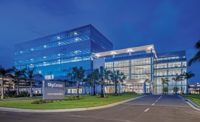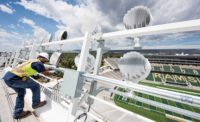With a four-decade record of reliability and the knack to make major projects succeed, Everett, Wash.-based Valley Electric has become the go-to electrical contractor for large-scale, hard-bid projects in the Pacific Northwest.
For Kirk Cannon, chief operating officer, that recognition has been a result of the company’s culture. “We support our employees and our customers with our ethics and our vision of having fun, trusting each other and doing the right thing,” he says. “That’s what I want people to think about us.”
With offices in Everett, Seattle and Moses Lake, Wash., Chatsworth, Calif., and following its 2023 acquisition of Comet Electric Inc., Valley’s operational footprint includes Washington, Oregon, Idaho, California and Nevada. The contractor has grown to 1,200 employees as its revenue continues to recover from the pandemic-related downturn, topping $169 million overall last year.
This is in no small part due to the company’s work on some of the region’s marquee projects, including the $1-billion, progressive design-build SeaTac International Arrivals Facility, the $700-million, design-assist Washington State DOT Renton to Bellevue Corridor and the $900-million Expedia Corporate Campus.
“That is our bread and butter,” says Jeret Garcia, the firm’s president and CEO. “The bigger the job, probably the more qualified and the more successful we’re going to be.”
Valley’s clients concur. “They simply are one of the top electrical contractors in the Pacific Northwest and have earned that position by being an honest and trusted partner while delivering quality installations,” says Troy Thurn, senior principal, engineering, Stantec Consulting Services.
For its sustained growth, stellar reputation with its clients and continued contributions to major projects across the Pacific Northwest, Valley Electric has been named ENR Northwest Specialty Contractor of the Year.
Valley’s success over the last 15 years can also be attributed to its ability to meet customer demands in an evolving industry by expanding its portfolio of services and adopting leading-edge technologies.
Garcia joined the company in 1999 as a large project manager and moved up the ranks to chief estimator where he created and led the firm’s transportation and industrial divisions. He became president and CEO of Valley in 2009.

Valley Electric was a part of the team building the SeaTac Airport International Arrivals Facility.
Photo courtesy Valley Electric
In 2012, Valley landed its first design-build project, the $40-million electrical design for Washington State DOT’s Washington State Route 520, Eastside Transit and HOV Project.
In 2012, Garcia and Cannon, along with Rob Carrithers, chief financial officer, and Ron Denson, vice president of design, purchased Valley. With a new team at the helm, Garcia and crew took stock.
“We started looking at what kind of culture we wanted to have,” Garica says. “We really rebranded, and I don’t mean with new colors and new logos. We rebranded our company from a hard-bid public works contractor to a more customer-centric general (electrical) contractor.”
This evolution required changing Valley’s methodology. “Our market here changed heavily to [electrical contractor construction management], Garcia says, “so we geared ourselves more towards that.”
It was a fortuitous shift. Valley grew from an $80-million-a-year enterprise in 2009 to a $200-million-plus company prior to the pandemic. The firm’s design-build work on projects like Seattle’s $200-million Allen Institute for Brain Science won acclaim, including ENR Northwest’s 2016 Higher Education Project of the Year award and ENR national’s 2017 Project of the Year award.
Mark Kane, chief operating officer for Bellevue, Wash.-based GLY Construction, whose firm has worked with Valley for over 30 years and was the general contractor for the Allen Institute, has high praise for Valley’s design-build work.
“The majority of the work that we have completed together has been on a design-build basis, and we have completed extensive work for the region’s technology leaders,” Kane says. “They have always performed at an exceptional level and have managed some of the largest and most technically challenging projects in our company’s history.”
Kane also lauded Valley’s ability to successfully bring significant resources to bear on behalf of its clients.
“Some of these projects had electrical manpower in excess of 300 journeymen, and they have the skills and experience to manage these large electrical projects,” he says.
Valley Electric also invests in the community. Garcia is co-founder of ConstructDiversity, a not-for-profit foundation that promotes careers in the construction industry by providing technology, mentorship, industry exposure, internships and scholarship funds to pursue higher education in university or trade schools.
The firm also supports charity events in the Pacific Northwest including Skanska’s Rainier Scholars Annual Fundraiser, the Leukemia & Lymphoma Society’s Light the Night Walk, Mary’s Place, the YMCA Dodgeball Tournament for the Make a Splash Program, Farmer Frog, Habitat for Humanity and NAIOP’s Community Enhancement Project. The Valley Secret Santa program serves over 200 children every year.
Garcia is optimistic about Valley’s future as it continues to expand its services.
“We’re positioned great,” he says. “With our diversity, a great culture and reputation, I think we are poised to be able to grow wherever and in whatever way we want.”





Post a comment to this article
Report Abusive Comment